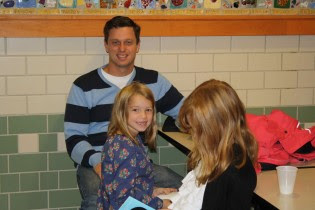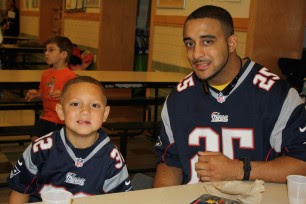Dear Sprague Community, This year, Mr. Hagar-McKee will be featuring two grade levels at a time in concert. These concerts will take place in November, January, and April. The first one will be on November 20 featuring students in grade 1 and grade 3. Parents are invited to see children sing at 8:45. Grades 4 and 5 will be featured in a January 22 concert. Students in Kindergarten and grade 2 will be featured on April 15. More baby news….Mrs. Genie Gledhill Madden is expecting her first child in April. We are so excited for Mrs. Madden and her family! Please see the following from our librarian, Ellen Mandel: Library News ~ MCBA program for 4th and 5th grade students The Massachusetts Children’s Book Award Reading Program (MCBA) for fourth and fifth grades began this fall, and will culminate in an assembly scheduled for Friday, April 1st. The program was started in 1975 by Dr. Helen Constant at Salem State College as a way to address the fact that many children lost interest in reading when they reached fourth grade. We are delighted that Sprague students will be participating with their classmates at Bates, Schofield, and Upham, along with over 175 schools throughout the state as they vote for their favorite book. Once again, the PTO has graciously agreed to support this program. Their funding allows us to buy multiple copies of the 25 nominated titles. Many titles are available for audio and/or e-book download on the Wellesley Free Library website through an audio lending program called OVERDRIVE. As an added component to the program, fifth grade students are asked to write book reviews for five or more titles. The MCBA program was created for students in fourth through sixth grade. Therefore, the books span a wide range of genre and reading levels. We don’t expect that students will like, and/or, read all twenty-five titles. We do, however, encourage everyone to read at least five of the titles in order to be eligible to vote in March. Happy Reading, Mrs. Mandel & Miss Gradwohl Dates to remember: November 11: Veteran’s Day—NO SCHOOL November 12: PTO meeting at 9:00 a.m. in the cafeteria November 17: Picture re-take day November 20: Concert featuring grade 1 and grade 3 students—Parents welcome November 26, 27: Thanksgiving Break November 30: NO SCHOOL—Staff Professional Day From Dads and Donuts at the Book Fair: 
 From the Nurse’s Office: Head Lice Information This is the time of year when we tend to see an increased incidence of head lice in school-aged children. Communication and proper management are the key components in dealing with an infestation and minimizing transmission to other students. These responsibilities are shared between home and school. I am here to be a resource and provide accurate information and, in addition, help sift through misinformation. Pediculosis (head lice) is a prevalent problem in school-aged children. Head lice are one of the most communicable conditions with an estimated 6 – 12 million infestations occurring every year. Head lice are not dangerous; they do not transmit disease and are not a public health issue. They are a nuisance because head lice treatment is tedious, time consuming, and can be expensive. Head lice should not disrupt the educational process. Helpful Information… • Check your child’s head regularly as part of your routine hygiene – at least once a week. • Watch for signs of head lice such as frequent head scratching especially behind the ears and at the nape of the neck. • Remind your children not to share personal items such as hats, helmets, combs, hair accessories, pillows. • Hairstyles that restrain the hair, such as ponytails and braids, prevent spread. • Head lice are mostly spread by direct head-to head contact. • Head lice transmission can occur at home, school or in the community. What to look for… • Find a comfortable area with good light. • Look carefully throughout the entire scalp. (I wear magnifying /reading glasses.) • Lice are wingless insects about the size of a sesame seed. They are usually reddish brown in color. They move quickly and shy away from light. (This makes them more difficult to see.) • The determination of head lice is more often made by seeing nits (eggs) than by finding crawling head lice. • Nits are tiny, oval-shaped, and are usually beige or grayish white in color. • Nits are attached to the hair shaft at an angle and do not wash or blow away. If you find head lice… • Please call me for advice. • You may contact your pediatrician for treatment recommendations. • Follow directions very carefully and read all the warning labels if you use products. • Be aware that over-the-counter products do not kill 100% of the lice and nits. • Combing and manual removal of lice are essential components to successfully removing ALL nits and lice from the head. This may take several days to accomplish. • Check all other members of the household. Only those with live lice or nits close to the scalp should be treated. • Do not reapply treatment more frequently than recommended. • Be aware that there are many websites that offer advice and products regarding head lice management; not all are useful and accurate. (Your child’s pediatrician and school nurse are the best resources for information regarding head lice management.) • Contact me if any questions during this process. • According to Wellesley Public Schools protocol, the school nurse must assess your child after treatment prior to returning to school. Environmental Issues… • Machine wash using hot water and regular detergent all clothing and bed linens that have been in contact with the infected person or dry on the hot cycle for at least 20 minutes. • Items not washable such as toys, pillows etc. should be stored in a tightly sealed plastic bag for two weeks. • Vacuum carpets, floors, upholstered furniture and the car. • Soak combs and brushes in hot water for 20 minutes or replace them. • Notify anyone with whom your child has been in close contact with so that they can monitor for evidence of head lice. Resources: National Association of School Nurses www.nasn.org American Academy of Pediatrics http://pediatrcs.aappublications.org/content/110/3/638.full.pdf Massachusetts Department of Public Health http://www.state.ma.us/dph/ Please don’t hesitate to contact me if you need additional information or support. Your partnership is appreciated as we navigate through this sometimes difficult and emotional issue. Sharon Sprague School Nurse
From the Nurse’s Office: Head Lice Information This is the time of year when we tend to see an increased incidence of head lice in school-aged children. Communication and proper management are the key components in dealing with an infestation and minimizing transmission to other students. These responsibilities are shared between home and school. I am here to be a resource and provide accurate information and, in addition, help sift through misinformation. Pediculosis (head lice) is a prevalent problem in school-aged children. Head lice are one of the most communicable conditions with an estimated 6 – 12 million infestations occurring every year. Head lice are not dangerous; they do not transmit disease and are not a public health issue. They are a nuisance because head lice treatment is tedious, time consuming, and can be expensive. Head lice should not disrupt the educational process. Helpful Information… • Check your child’s head regularly as part of your routine hygiene – at least once a week. • Watch for signs of head lice such as frequent head scratching especially behind the ears and at the nape of the neck. • Remind your children not to share personal items such as hats, helmets, combs, hair accessories, pillows. • Hairstyles that restrain the hair, such as ponytails and braids, prevent spread. • Head lice are mostly spread by direct head-to head contact. • Head lice transmission can occur at home, school or in the community. What to look for… • Find a comfortable area with good light. • Look carefully throughout the entire scalp. (I wear magnifying /reading glasses.) • Lice are wingless insects about the size of a sesame seed. They are usually reddish brown in color. They move quickly and shy away from light. (This makes them more difficult to see.) • The determination of head lice is more often made by seeing nits (eggs) than by finding crawling head lice. • Nits are tiny, oval-shaped, and are usually beige or grayish white in color. • Nits are attached to the hair shaft at an angle and do not wash or blow away. If you find head lice… • Please call me for advice. • You may contact your pediatrician for treatment recommendations. • Follow directions very carefully and read all the warning labels if you use products. • Be aware that over-the-counter products do not kill 100% of the lice and nits. • Combing and manual removal of lice are essential components to successfully removing ALL nits and lice from the head. This may take several days to accomplish. • Check all other members of the household. Only those with live lice or nits close to the scalp should be treated. • Do not reapply treatment more frequently than recommended. • Be aware that there are many websites that offer advice and products regarding head lice management; not all are useful and accurate. (Your child’s pediatrician and school nurse are the best resources for information regarding head lice management.) • Contact me if any questions during this process. • According to Wellesley Public Schools protocol, the school nurse must assess your child after treatment prior to returning to school. Environmental Issues… • Machine wash using hot water and regular detergent all clothing and bed linens that have been in contact with the infected person or dry on the hot cycle for at least 20 minutes. • Items not washable such as toys, pillows etc. should be stored in a tightly sealed plastic bag for two weeks. • Vacuum carpets, floors, upholstered furniture and the car. • Soak combs and brushes in hot water for 20 minutes or replace them. • Notify anyone with whom your child has been in close contact with so that they can monitor for evidence of head lice. Resources: National Association of School Nurses www.nasn.org American Academy of Pediatrics http://pediatrcs.aappublications.org/content/110/3/638.full.pdf Massachusetts Department of Public Health http://www.state.ma.us/dph/ Please don’t hesitate to contact me if you need additional information or support. Your partnership is appreciated as we navigate through this sometimes difficult and emotional issue. Sharon Sprague School Nurse
Wellesley Public Schools would like to continue connecting with you via email. If you prefer to be removed from our list, please contact Wellesley Public Schools directly. To stop receiving all email messages distributed through our SchoolMessenger service, follow this link and confirm: Unsubscribe If you need to update your email address or phone number, please contact the secretary at your child’s school. SchoolMessenger is a notification service used by the nation’s leading school systems to connect with parents, students and staff through voice, SMS text, email, and social media.
